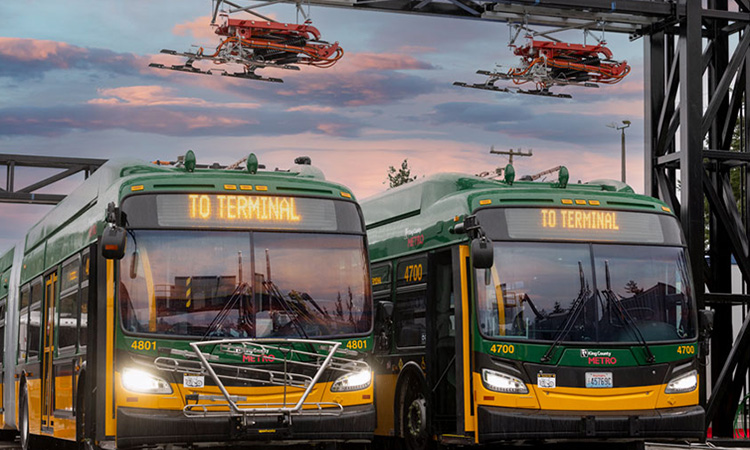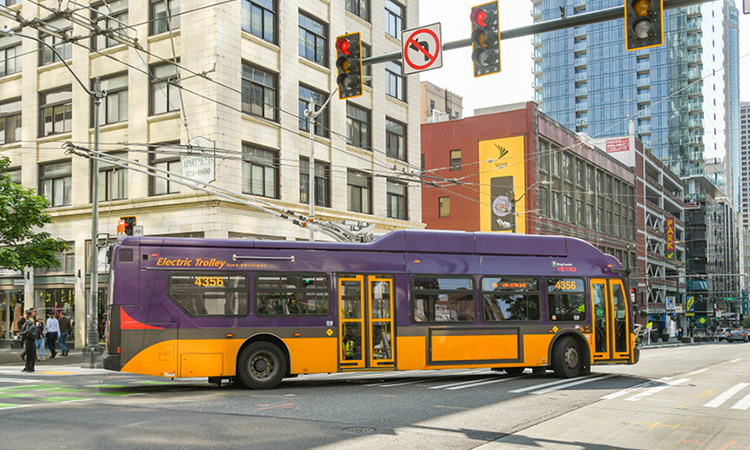Transforming transit for a greener tomorrow
- Like
- Digg
- Del
- Tumblr
- VKontakte
- Buffer
- Love This
- Odnoklassniki
- Meneame
- Blogger
- Amazon
- Yahoo Mail
- Gmail
- AOL
- Newsvine
- HackerNews
- Evernote
- MySpace
- Mail.ru
- Viadeo
- Line
- Comments
- Yummly
- SMS
- Viber
- Telegram
- Subscribe
- Skype
- Facebook Messenger
- Kakao
- LiveJournal
- Yammer
- Edgar
- Fintel
- Mix
- Instapaper
- Copy Link
Posted: 20 June 2023 | Carrie Lee - King County Metro | No comments yet
Carrie Lee, Sustainability and Climate Program Manager at King County Metro, discusses the importance of collaborative partnerships and innovative strategies in driving the transition to a zero-emission fleet, as well as highlights the positive impact it will have on reducing greenhouse gas emissions, improving air quality and creating a more resilient and equitable region for future generations.


Credit: King County Metro
Every week, more than one million people use King County Metro‘s buses, on-demand services, paratransit vans, water taxis and other modes to get to where they need to go. Metro serves 37 cities in Washington state, including Seattle, and a county with a population that’s greater than 15 U.S. states.
We are on track to be one of the first large transit agencies in North America with a 100% zero-emission fleet by 2035″
We’re also proud to be an industry leader in how we deliver our service sustainably. Our transition to a zero-emission fleet powered by renewable energy is part of King County’s holistic approach to combat climate change. We are on track to be one of the first large transit agencies in North America with a 100% zero-emission fleet by 2035.
An integrated plan
By 2030, King County is committed to cutting all county-wide greenhouse gas emissions – from private, public and other sectors – in half”
When I say holistic, I mean that our climate change goals for transit are integrated into King County’s Strategic Climate Action Plan. This broader plan confronts climate change by building a more resilient, sustainable and equitable King County. By 2030, King County is committed to cutting all county-wide greenhouse gas emissions – from private, public and other sectors – in half, preparing the region for climate impacts, and elevating the voices of the communities that are most impacted.
Single occupancy vehicles are still one of our region’s primary sources of climate pollution. Thus, Metro is focused on both eliminating greenhouse gas emissions from our fleet and delivering a regional, innovative and integrated mobility network that makes it even more compelling for residents and visitors to leave the driving to us.


Groundwork and a promise
In 2023, we will make our last ever purchase of hybrid buses and then will move exclusively to acquiring zero-emission buses – whether battery electric or trolley”
At the start of this century, when most transit agencies were still exclusively purchasing diesel-only vehicles, Metro had already started to transition to a cleaner fleet.
Metro has been making the shift away from fossil fuels for decades, starting with our 174 ‘trackless trolleys’, the original green transit vehicle. Our trolleys have been powered by zero-emission hydroelectric power for over 75 years. In 2015, Metro re-committed to keeping and expanding the role of trolleys in our fleet. Today, they serve as the foundation of our zero-emission transition.
In 2020, Metro used a ceremonial ‘golden tire’ to mark the retirement of the last diesel-only buses from our system. Our 1,500-vehicle fleet now consists of three types of buses – electric trackless trolleys, hybrid (diesel-electric) buses and battery electric buses. In 2023, we will make our last ever purchase of hybrid buses and then will move exclusively to acquiring zero-emission buses – whether battery electric or trolley.
Early wins for the next generation of battery electric buses
Seattle is a city of rain. It’s also a city of hills, and the buses that we’re buying will have to conquer both the weather and topography. As we continue to learn more about operating our current fleet of 40- and 60-foot battery electric buses under these conditions, they have already amassed over 400,000 miles in their first year of service.
Pushing technological boundaries
Metro’s battery electric future is only as strong as the infrastructure that supports it. We continue to invest in the charging equipment and information technology needed to support our vehicles.
We continue to invest in the charging equipment and information technology needed to support our vehicles”
Our newest battery electric buses operate from our South Base Test Facility in Tukwila, a city south of Seattle. This state-of-the-art facility supports our learning and testing to optimise our approach and to guide the future design of our entire system. Evaluation of the functionality of the different chargers and the supporting technology will inform operating and infrastructure decisions for our depots and bus layover locations throughout the region.
While this work is urgent, we’re also aware that the scale compounds the complexity and risks. We are building two new depots and converting seven existing depots, investing in technology to support our large operations, competitively procuring buses, modelling a future service network which is significantly different than today, and building our business processes and workforce training.
With no model for this work, we are leaning in on our partnerships with peer agencies and learning as we go. Electrification is a fast evolving landscape, and there are limited standards resulting in interoperability issues and communication challenges between chargers, buses and supporting software. Technology to support charge, dispatch and yard management for battery electric bus fleets is in its early maturity, resulting in reliability issues. Thus, Metro is actively engaging in standards development by investing staff time to participate and ensure the industry meets the needs of transit providers.


Credit: King County Metro
Designing bus depots as sustainable as the fleet they support
Design is underway for the construction of our next new depot, set to begin operation in 2027. We are pursuing Energy Petal certification from the International Living Future Institute for this project. This means that the base would be net zero, eliminating fossil fuel emissions from the facility and generating or purchasing renewable energy for all of its electrical needs. The design will also strengthen the connection of our workforce with the natural environment, improving indoor air quality and employee wellbeing. In addition, the site work for the depot will improve salmon habitats by restoring two branches of a creek near the building.
Prioritising climate justice
Metro and King County are focused on centring and elevating the voices of communities that have been disproportionately impacted by climate change and fossil fuel pollution”
The shift to zero-emission will meet our goals to reduce greenhouse gas emissions, but it will also help us to reduce the inequities that are exacerbated by climate change. Metro and King County are focused on centring and elevating the voices of communities that have been disproportionately impacted by climate change and fossil fuel pollution.
Our zero-emission transition is focused on providing the benefit of reduced air pollution first to communities that have historically been most impacted by air pollution. The U.S. Department of Transportation’s (USDOT) Federal Transit Administration (FTA) acknowledged this commitment in 2022, when it recognised Metro for leading the way among large transit agencies nationwide in its equitable approach to tackling climate change.
Partnerships
Our holistic approach means collaboration across municipalities and agencies throughout the region. Battery electric buses need electricity, and Metro is working with King County’s primary regional electricity providers and with the cities that we serve as we make this transition. Seattle City Light was our partner in the construction of the South Base Test Facility, and Puget Sound Energy has provided chargers for our non-revenue fleet at one of our depots. Both providers are preparing their power grids and renewable energy supply to meet our demand.
Focusing on our workforce
Electrification will require us to transform how we operate and introduce new business processes and standard operations for both day-to-day operations and for emergency response. To meet this need, Metro created a Battery-Electric Bus Academy to train and retain staff. We also continue to adjust and refine our recruitment strategy to attract and grow the diverse, skilled talent needed to support this work in a highly competitive labour market.
Transit can change the world
Metro is one player among many that need to take bold action on climate. Our greatest charge and responsibility in our communities and in the industry is to show how it can be done and to be a resource. We look forward to sharing the lessons that we learn, gaining knowledge from other transit agencies, and moving forward together – locally and globally – to take on this challenge.


Related topics
Air Quality, Alternative Power, Mobility Services, Passenger Experience, Public Transport, Sustainable Urban Transport
Related modes
Bus & Coach
Related cities
Washington
Related countries
United States
Related organisations
Federal Transit Administration (FTA), King County Metro, U.S. Department of Transportation (USDOT)
Related people
Carrie Lee








